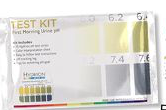Hello Everyone,
It is summer and we are all enjoying being outside. The outdoor activities have led a few patients to broken bones. Most fractures are from real hard falls and events that nothing would have prevented the fracture. But I can’t help but think about making our bones stronger with the possibility of preventing a fracture the next time you or I take a fall.
The long bones, our arms and legs, are considered the stronger bones. Their function is weight bearing only. Other bones are involved in red blood cell production containing bone marrow. The housing of the bone marrow means they are somewhat hollow and while still strong, they are not as strong as long bone. So if you break your wrist or ankle it is something to thing about. Was the fracture unavoidable or does it mean I may not be as bone dense as I should be? There are some easy ways to find out if I am on the right track with health bone density.
Bone cells will be made at a healthy replacement rate as long as there is plenty of cellular energy. Cell energy is based on the ability of the cell to turn food, in this situation triglycerides, into an energy molecule called ATP. This entire system is based on the cellular component called mitochondria. Mitochondria are sensitive to hydrogen build up. One of the goals with a balanced diet of fruit, vegetables, and meats is to keep this hydrogen balance. The problem for all of us is we tend to over do it on the hydrogen rich foods, what we would call acid forming foods. Fruit and vegetables are lower in acids and the proteins, sugars, and alcohol tend to be high in acids. What makes colas and root beer taste so good is phosphoric acid. This is a very strong acid and cannot be balanced with food.
We can tell if the overall acid burden is high with the first morning’s urine pH. The overnight urine pools acid loads and the get out of bed urine matches cellular pH fairly well. We want the litmus paper to be medium to dark green. The paper is orange, if it stays orange you have a high acid load.
The high acids mean your cells are full of hydrogen. Two hydrogens grab an oxygen and this makes water. The days you wake up and feel puffy or low in energy are the days you are holding water and are not producing energy. The reason is you are holding water resulting in the shutdown of the mitochondria. The mitochondria are proton gradient sensitive. The fancy word means they drowned.
The bones will shed 40 – 70 mg of minerals on a daily basis to bind up the excess hydrogen getting it out of the body to bring the pH back into balance. We are supposed to be rebuilding the lost minerals with dark green vegetables and a low acid food intake. Well there are days that my refrigerator does not pass the test. The shedding of minerals adds up and there is a thing called osteopenia and osteoporosis. An example here, your muscle cramps are low magnesium. Because the magnesium was used to bind up excess hydrogen and now the muscle is tight.
The thinking is that if I break a wrist my bone density has changed. If my long bones, the stronger bones, are now breaking it makes me wonder about my spinal column and the vertebrae density? We do not need a compression fracture and be bent in half or the spontaneous hip fracture. We see too many wrist and ankle fractures in younger people. The reason is the modern diet is high in acid forming foods. It is not easy keeping a balance in what we eat. We need help keeping our bones strong with diet, supplements, sunlight for vitamin D, and physical activity.
Weight bearing activity forces minerals to stay in the bones and it works. Our goal is to not have to worry about bone density and we can get there with some simple diet changes and tracking the first morning’s urine pH.
The next time you are having pizza or wings order a side salad. If you get ice tea get the unsweetened, use a lemon. Stay with the clear sodas and stop the colas. The vegetables are alkaline. The sugar is acidic so avoiding the sugar helps keep the acids down with the caffeine in the tea, and the lemon is alkaline. Clear sodas are acidic but not near the acid level of the colas. Our efforts to eat better add up and have a positive impact.
If you haven’t checked your first morning’s urine pH acid load before, please stop by the office for a free kit to go home with. If you are familiar with this buy a roll the next time you are in the office and track the pH. Find out what foods your body responds to in a positive way and which foods are hard on you with pH changes.

We also have an acid and alkaline food list that you can pick up next time you are visiting as well.
Bone density is dependent on magnesium and vitamin D far more than calcium. Bone density is also very dependent on the trace minerals. This is why when you read the label on your bone formula you will see all these other odd named minerals. Calcium stays in the bone when magnesium is plentiful and will leave if the magnesium is not there, (magnesium absorption is sensitive to the acid load), and calcium will leave when the trace minerals are not present. Vitamin D keeps the calcium in the bone as well.
Enjoy the good weather and the soon to come fresh fruit and vegetables.
Thanks for reading.
